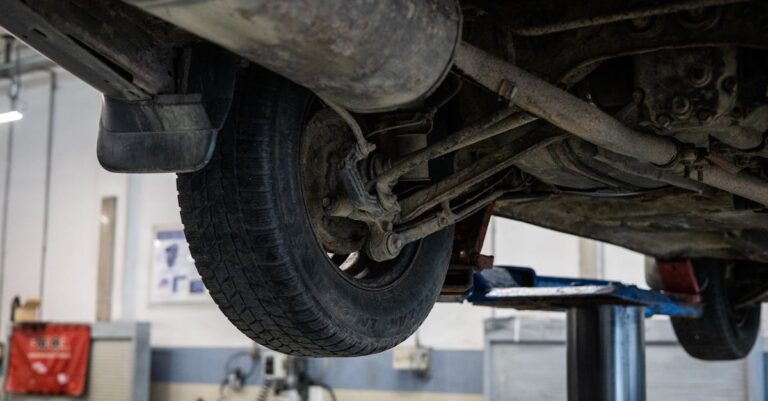Table Of Content
- Signs Your Car Needs A Tune Up: Don’t Ignore These Warnings!
- What Exactly *Is* a Tune Up Nowadays?
- Why Bother With Regular Tune Ups? (Hint: It Saves You Big Bucks)
- Listen Up! Telltale Signs Your Car is Screaming for a Tune Up
- Sign #1: That Pesky Check Engine Light Just Won’t Quit
- Sign #2: Rough Idling or Unexpected Stalling
- Sign #3: Your Car Suddenly Hates Starting
- Sign #4: Your Wallet Weeps at the Gas Pump (Decreased Fuel Efficiency)
- Sign #5: Feeling Sluggish? Loss of Acceleration or Power
- Sign #6: Hearing Things? Strange Noises Like Knocking or Pinging
- Sign #7: What’s That Smell? Unusual Odors Coming From Your Car
- Sign #8: The Engine Feels… Off (Misfiring or Running Unevenly)
- So, What’s Actually Checked During a Modern Tune Up?
- Don’t Wait for Trouble: The Magic of Preventative Maintenance
- Conclusion: Your Car Talks, Are You Listening?
- Frequently Asked Questions (FAQs)
Signs Your Car Needs A Tune Up: Don’t Ignore These Warnings!
Hey there, fellow driver! Let’s chat about something crucial for keeping your trusty steed running smoothly: the humble tune up. Remember the days when a “tune up” meant fiddling with carburetors and distributor caps? Well, things have changed a bit with modern cars, but the *need* for periodic check ups and adjustments hasn’t gone anywhere. Your car, much like your own body, gives you little hints (and sometimes big, flashing warnings) when something isn’t quite right. Ignoring these signs? That can lead to bigger headaches, poorer performance, and lighter wallets down the road. Think of this as learning your car’s unique language – understanding its subtle (and not so subtle) cries for help. So, buckle up as we dive into the key signs that scream, “Hey! I need a tune up!”
What Exactly *Is* a Tune Up Nowadays?
Before we get into the warning signs, let’s clear something up. The term “tune up” itself is a bit of a throwback. Back in the day, cars needed frequent adjustments to ignition timing, carburetor settings, and points. Modern vehicles, packed with computers and sophisticated engine management systems, are much more self sufficient. So, a “tune up” today isn’t about manually tweaking those old school components.
Instead, think of a modern tune up as a comprehensive preventative maintenance service focused on your engine’s performance and efficiency. It typically involves inspecting and replacing key components that wear out over time and directly impact how well your engine runs. This might include things like spark plugs, filters (air, fuel), checking belts and hoses, inspecting ignition system components (like coils), and potentially cleaning fuel injectors or throttle bodies. Essentially, it’s about ensuring the core systems responsible for combustion – air, fuel, and spark – are all working in harmony. It’s less about “tuning” and more about “replacing and inspecting” wear items to keep the engine *in tune*.
Why Bother With Regular Tune Ups? (Hint: It Saves You Big Bucks)
Okay, so why should you care about getting these inspections and replacements done? Isn’t it easier just to wait until something actually breaks? Well, let me ask you this: would you rather pay a bit now for preventative care or a whole lot later for a major repair caused by neglect?
Regular tune ups are your secret weapon against costly breakdowns. By catching small issues early – like a dirty air filter restricting airflow or worn spark plugs causing inefficient combustion – you prevent them from snowballing into bigger, more expensive problems. Think engine damage, catalytic converter failure, or even being stranded on the side of the road. Ouch.
Beyond preventing disasters, tune ups boost performance and efficiency. A well maintained engine simply runs better. You’ll often notice smoother acceleration, more consistent power, and, importantly, better fuel economy. Yes, spending a little on a tune up can actually save you money at the gas pump in the long run! Plus, it contributes to cleaner emissions, which is good for everyone. It’s an investment in your car’s longevity, reliability, and overall driving experience.
Listen Up! Telltale Signs Your Car is Screaming for a Tune Up
Alright, let’s get to the heart of it. Your car is pretty good at communicating, even if it doesn’t use words. You just need to know what to look, listen, and feel for. Here are some of the most common signals that your engine could use some professional attention:
Sign #1: That Pesky Check Engine Light Just Won’t Quit
This one’s pretty obvious, right? That little engine shaped light glowing on your dashboard is your car’s most direct way of saying, “Houston, we have a problem!” While it can indicate a vast range of issues, from minor to major, many potential causes are directly related to components typically addressed during a tune up.
Don’t Just Stare at the Glow!
It’s tempting to ignore it, especially if the car *seems* to be running okay. Maybe you put a piece of tape over it (we’ve all thought about it!). But please, don’t do that. The Check Engine Light (CEL) is connected to your car’s onboard diagnostic system (OBD II). When it lights up, it means the system has detected a fault and stored a corresponding trouble code. Ignoring it can lead to worsening problems, reduced fuel economy, failed emissions tests, and potentially severe engine damage.
What Could Be Hiding Behind the Light?
While a loose gas cap can sometimes trigger the CEL (seriously!), it often points to issues needing a tune up. Common culprits include:
- Faulty Spark Plugs or Wires: Worn plugs or damaged wires can cause misfires, triggering the light.
- Oxygen Sensor Failure: This sensor monitors exhaust gases and helps regulate the fuel mixture. A bad sensor hurts fuel economy and emissions.
- Mass Airflow Sensor Issues: Problems here can mess up the air fuel ratio.
- Catalytic Converter Problems: Often a consequence of ignoring other issues (like misfires), this is an expensive fix you want to avoid.
A mechanic can read the diagnostic code to pinpoint the problem, and often, the solution involves replacing components checked during a tune up.
Sign #2: Rough Idling or Unexpected Stalling
Does your car shake, vibrate, or sound uneven when you’re stopped at a light? Does it sometimes just… quit on you, stalling unexpectedly? These are classic signs that your engine isn’t happy and likely needs attention.
Feeling the Shakes? Why Your Car Idles Rough
A smooth idle means your engine is consistently firing on all cylinders while at rest. Rough idling often feels like the engine is sputtering or about to die. This can be caused by several tune up related issues:
- Worn Spark Plugs: If plugs aren’t firing reliably, combustion becomes uneven.
- Dirty Fuel Injectors: Clogged injectors can’t deliver the right amount of fuel consistently.
- Vacuum Leaks: Unmetered air entering the engine throws off the air fuel mixture.
- Clogged Air Filter: Restricts airflow needed for smooth combustion.
- Faulty Ignition Components: Issues with coils or wires can lead to inconsistent spark.
Basically, anything that disrupts the precise balance of air, fuel, and spark required for smooth combustion can cause a rough idle.
Stalling: More Than Just Annoying, It’s Dangerous
If rough idling is annoying, stalling is downright dangerous, especially if it happens while driving. Stalling indicates a more significant interruption in the combustion process. Many of the same culprits causing rough idling can also lead to stalling if the problem is severe enough. Fouled spark plugs, severely clogged fuel filters or injectors, or significant vacuum leaks can starve the engine of what it needs to keep running. Don’t mess around with stalling – get it checked ASAP.
Sign #3: Your Car Suddenly Hates Starting
You turn the key (or push the button), and instead of that satisfying VROOM, you get… hesitation? A slow, struggling crank? Or maybe nothing at all? Difficulty starting is a frustrating sign that something is amiss, often pointing towards tune up territory.
The Slow, Painful Crank Struggle
If the engine turns over slowly, like it’s struggling through molasses, it could be a weak battery or alternator. However, it can *also* be related to issues that make the engine harder to turn over, sometimes linked to poor combustion efficiency. More commonly related to a tune up, though, is when the engine cranks normally but just won’t *catch* or takes many tries to fire up.
Is Your Ignition System Playing Coy?
For your engine to start, it needs fuel delivered and spark at the right time. Problems here are prime tune up candidates:
- Weak Spark: Worn spark plugs or failing ignition coils might not produce a strong enough spark to ignite the fuel mixture easily, especially when the engine is cold.
- Fuel Delivery Issues: A clogged fuel filter or weakening fuel pump might prevent enough gasoline from reaching the cylinders for startup.
- Sensor Problems: Issues with sensors like the crankshaft or camshaft position sensor can prevent the ignition system from firing correctly.
If starting becomes a gamble, it’s time for a check up.
Sign #4: Your Wallet Weeps at the Gas Pump (Decreased Fuel Efficiency)
Are you visiting the gas station more often than you used to, even though your driving habits haven’t changed? A noticeable drop in miles per gallon (MPG) is a clear signal that your engine isn’t running as efficiently as it should be, and a tune up is often the cure.
Seriously, Where Did All Your MPG Go?
Lots of factors can impact fuel economy (tire pressure, driving style), but a decline often points to the engine working harder than necessary. This inefficiency frequently stems from components needing service:
- Dirty Air Filter: Like trying to breathe through a clogged straw, a dirty filter makes the engine struggle for air, forcing it to use more fuel.
- Worn Spark Plugs: Incomplete fuel combustion due to weak spark means wasted gasoline.
- Faulty Oxygen Sensors: Incorrect readings lead to an improper air fuel mixture, often making it too rich (using too much fuel).
- Clogged Fuel Injectors: Poor fuel spray patterns lead to inefficient burning.
- Underinflated Tires: Okay, not strictly a *tune up* item, but always check this first! It’s a common fuel economy killer.
How a Tune Up Rescues Your Fuel Economy
By replacing worn plugs, swapping out dirty filters, and ensuring sensors are reading correctly, a tune up restores your engine’s ability to burn fuel efficiently. Clean filters allow optimal airflow, new plugs ensure complete combustion, and functioning sensors maintain the perfect air fuel ratio. The result? More miles for your money!
Sign #5: Feeling Sluggish? Loss of Acceleration or Power
Does your car feel hesitant when you press the gas pedal? Does it struggle to get up hills or merge onto the highway? A noticeable decrease in acceleration or overall power is a strong indicator that your engine isn’t performing at its peak, and tune up related issues are often the cause.
Think of it like an athlete who’s out of shape. Your engine needs the right combination of air and fuel, delivered precisely and ignited powerfully, to generate maximum horsepower. When components responsible for this process wear out, performance suffers. A clogged fuel filter restricts fuel flow, preventing the engine from getting the gas it needs under demand. A dirty air filter chokes the engine, limiting the air required for combustion. Worn spark plugs or faulty ignition coils deliver weak or inconsistent spark, leading to poor power output. Even exhaust restrictions, like a partially clogged catalytic converter (sometimes caused by unresolved misfires), can severely hamper performance. A tune up addresses these potential bottlenecks, restoring the engine’s ability to breathe, fuel itself, and ignite effectively, bringing back that lost pep.
Sign #6: Hearing Things? Strange Noises Like Knocking or Pinging
Your car should generally hum along smoothly. When you start hearing unusual sounds coming from under the hood, especially during acceleration, it’s time to pay attention. Knocking or pinging noises are often signs of combustion problems that a tune up might address.
Pinging or knocking (sometimes called detonation) sounds like marbles rattling around in a can. It happens when the fuel air mixture ignites prematurely or unevenly in the cylinders. This can be caused by several factors, including using the wrong octane fuel, excessive carbon buildup in the cylinders, or engine overheating. However, it can also be linked to tune up items. For instance, spark plugs that are the wrong heat range or severely worn can contribute to detonation. Problems with the Exhaust Gas Recirculation (EGR) system, sometimes checked during deeper diagnostics associated with a tune up, can also cause knocking. Ignoring these sounds is risky, as detonation puts immense stress on engine components like pistons and bearings, potentially leading to catastrophic failure.
Sign #7: What’s That Smell? Unusual Odors Coming From Your Car
Our noses can be surprisingly good diagnostic tools! If you start noticing strange smells emanating from your car, particularly from the engine bay or exhaust, don’t just roll down the windows – investigate! Some odors are telltale signs of issues needing attention.
A strong smell of gasoline, especially if it’s persistent, could indicate a leak in the fuel system (like a leaky injector or fuel line), which is a serious fire hazard. However, a “rich” smell from the exhaust (like unburned gas) often points to an engine running inefficiently, possibly due to faulty spark plugs, a bad oxygen sensor, or a leaky fuel injector – all potential tune up fixes. A “rotten egg” (sulfur) smell typically points to a failing catalytic converter, which, as mentioned, can be a consequence of neglecting tune up needs that cause misfires or rich running conditions. A sweet smell might indicate a coolant leak, while a burning oil smell could mean an oil leak dripping onto hot exhaust parts. While not all smells point directly to a *classic* tune up, many are related to engine performance and fluid integrity, areas often inspected during comprehensive maintenance.
Sign #8: The Engine Feels… Off (Misfiring or Running Unevenly)
Sometimes, the sign isn’t a specific noise or light, but just a general feeling that the engine isn’t running smoothly. It might feel like it’s stumbling, hesitating, or vibrating more than usual, especially under load (like accelerating or going uphill). This sensation is often caused by an engine misfire.
A misfire occurs when one or more cylinders fail to ignite the fuel air mixture correctly, or at all. This throws the engine’s balance off, causing that rough, uneven feeling. It’s like trying to run with a limp. What causes misfires? You guessed it – prime tune up suspects!
- Bad Spark Plugs: The number one cause. Worn, fouled, or damaged plugs can’t deliver the spark needed.
- Faulty Ignition Coils or Wires: These deliver the high voltage to the plugs. If they fail, no spark.
- Clogged Fuel Injectors: If a cylinder isn’t getting enough fuel, it can’t fire properly.
- Vacuum Leaks: Can lean out the mixture in one or more cylinders.
- Low Compression: A more serious internal engine issue, but misfires are often the first symptom.
Misfires not only feel bad and rob power, but they also dump unburned fuel into the exhaust, which can quickly destroy your expensive catalytic converter. If your engine feels “off,” get it diagnosed.
So, What’s Actually Checked During a Modern Tune Up?
As we touched on earlier, the checklist for a modern tune up focuses on inspection and replacement of wear items crucial for engine performance and efficiency. While the exact specifics can vary slightly depending on the shop and your vehicle’s make, model, and mileage, here’s a general idea of what’s typically involved:
- Spark Plugs: Inspected for wear and fouling, and replaced as needed based on manufacturer recommendations or condition. Different plug types (copper, platinum, iridium) have different lifespans.
- Air Filter: Checked for dirt and debris and replaced if clogged to ensure proper airflow.
- Fuel Filter: Inspected and replaced according to the maintenance schedule to ensure clean fuel delivery. (Note: Some modern cars have lifetime filters integrated with the fuel pump).
- Ignition System Components: Wires, boots, and ignition coils are visually inspected for damage, cracks, or corrosion. Diagnostic tests might be run if misfires are suspected.
- Fluid Levels & Condition: Engine oil, coolant, brake fluid, power steering fluid, and transmission fluid are checked and topped off or recommendations for service are made if needed.
- Belts and Hoses: Inspected for cracks, wear, and proper tension.
- Battery Check: Terminals cleaned, and battery voltage/load tested.
- PCV Valve: The Positive Crankcase Ventilation valve is checked or replaced as it affects emissions and engine breathing.
- Potential Extras: Depending on symptoms or mileage, services like fuel injector cleaning, throttle body cleaning, or checking sensor operations might be recommended.
Essentially, it’s a thorough checkup focusing on the parts most likely to degrade and impact how well your engine breathes, gets fuel, and creates spark.
Don’t Wait for Trouble: The Magic of Preventative Maintenance
Think about it: you go to the doctor for check ups even when you feel fine, right? The same logic applies to your car. Waiting until you experience one of the major warning signs we discussed often means more hassle, more expense, and potentially being stranded.
Preventative maintenance, including regular tune ups based on your manufacturer’s recommended schedule (check your owner’s manual!), is the smartest approach. It allows technicians to catch wearing parts *before* they fail completely. Replacing spark plugs at their recommended interval, even if they haven’t caused a misfire *yet*, prevents potential catalytic converter damage down the line. Changing a dirty air filter *before* your fuel economy plummets saves you money and keeps the engine happy. It’s about staying ahead of the curve.
Following your car’s maintenance schedule is the easiest way to practice preventative care. It outlines when specific components, like spark plugs or filters, should ideally be replaced based on mileage or time. Sticking to this schedule is the best insurance policy against unexpected breakdowns and helps maintain your vehicle’s performance, reliability, and even resale value.
Conclusion: Your Car Talks, Are You Listening?
Your car is constantly communicating with you through sounds, smells, lights, and how it feels to drive. Those little hiccups, strange noises, warning lights, or dips in performance aren’t just annoyances; they’re signals that something needs attention. Ignoring the signs your car needs a tune up is like ignoring a check engine light on your own health – it rarely ends well and usually costs more in the long run. By recognizing these warning signs – rough idling, poor mileage, sluggishness, weird noises, or that dreaded check engine light – you can take proactive steps. Getting regular tune ups isn’t just about fixing problems; it’s about preventing them, ensuring your car runs efficiently, reliably, and safely for years to come. So, listen closely to your ride – it might just be trying to tell you it’s time for a little TLC.
Frequently Asked Questions (FAQs)
FAQ 1: How often does my car *really* need a tune up?
There’s no single answer, as it depends heavily on your car’s make, model, age, and the type of spark plugs it uses. Older cars needed tune ups much more frequently. Many modern cars with long life iridium or platinum plugs might only need spark plug replacement every 60,000 to 100,000 miles. However, filters and fluids need attention more often. Your best bet is always to consult your vehicle’s owner’s manual. It will provide the manufacturer’s recommended maintenance schedule, including intervals for spark plugs, filters, and other inspections.
FAQ 2: Isn’t a tune up just a fancy oil change?
Definitely not! While an oil change is crucial routine maintenance, it primarily focuses on lubricating the engine’s internal parts. A tune up is broader, targeting components essential for the combustion process: spark plugs (spark), air and fuel filters (air/fuel mixture), and potentially ignition system parts or fuel system cleaning. Think of an oil change as keeping the engine’s ‘blood’ healthy, while a tune up focuses on its ‘breathing’ and ‘metabolism’. Both are vital, but they address different systems.
FAQ 3: Can I save cash and DIY my car’s tune up?
Maybe, but it depends on your mechanical skill level and the specific tasks involved. Replacing an air filter is usually straightforward. Changing spark plugs can range from easy to very difficult depending on engine design (some require removing intake manifolds). You’ll also need the right tools (torque wrench, socket extensions, gapping tool). Diagnosing issues like a check engine light requires a code scanner and knowledge to interpret the codes. If you’re comfortable working on cars and have the tools, you might save on labor. If not, it’s often best left to a qualified mechanic to avoid causing further damage or misdiagnosing problems.
FAQ 4: Ouch! How much is this tune up going to cost me?
Costs vary significantly based on your vehicle (some engines are harder to access, parts cost more for certain brands), your location (labor rates differ), and exactly what services are included in the tune up. A basic tune up involving spark plugs and filters might range from $150 to $500. If more complex diagnostics are needed, or components like ignition coils or fuel injectors need replacing, the cost can climb higher, potentially reaching $800 or more. Always get a detailed estimate upfront outlining what parts and labor are included.
FAQ 5: If I get a tune up, will that annoying check engine light finally go away?
It depends entirely on *why* the check engine light is on. If the light was triggered by a fault directly addressed by the tune up (like worn spark plugs causing misfires, or a faulty oxygen sensor that gets replaced), then yes, the tune up should resolve the issue, and the light can be cleared. However, the check engine light can indicate hundreds of potential problems, some unrelated to typical tune up items (like transmission issues or evaporative emission system leaks). A proper diagnosis using a code scanner is necessary *before* the tune up to confirm the cause. A tune up is not a magic bullet for all CEL problems, but it often fixes common triggers.









